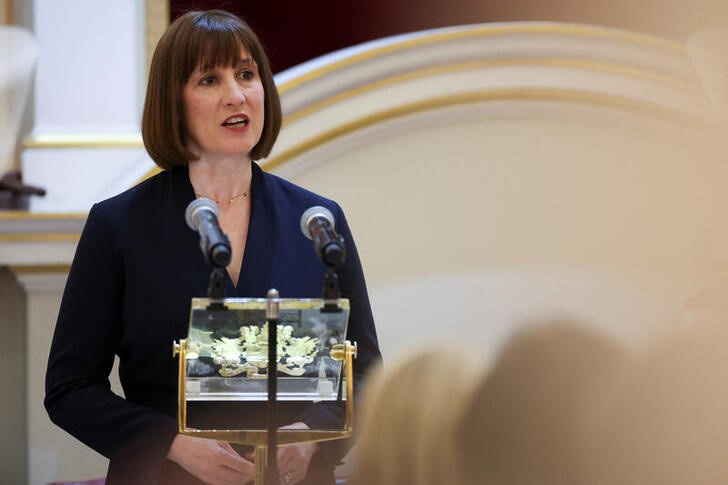By Sinead Cruise and David Milliken
LONDON (Reuters) -Finance minister Rachel Reeves on Thursday promised a reboot of regulation governing Britain's "crown jewel" financial industry, which she said has shackled the City's prospects since the global financial crisis and stifled British economic growth.
In a speech at the City of London's ornate Mansion House, Reeves vowed not to take Britain's status as a global financial centre for granted and pledged a raft of growth-focused reforms.
Her speech came as leaders across the industry brace for a possible bonfire of regulation on Wall Street during President-elect Donald Trump's second term in office, with leaner taxes and lighter rules on capital likely to widen an earnings gap between U.S. banks and their global competitors.
"While it was right that successive governments made regulatory changes after the global financial crisis, to ensure that regulation kept pace with the global economy of the time, it's important we learn the lessons of the past," Reeves said.
"These changes have resulted in a system which sought to eliminate risk taking. That has gone too far and, in places, it has had unintended consequences which we must now address."
The former Bank of England economist proposed five areas to maximise growth in British financial services: capital markets, fintech, sustainable finance, asset management and wholesale services, and insurance and reinsurance.
Reeves said the government would publish a financial services strategy early next year as part of a broader 10-year industrial plan.
"The UK has been regulating for risk, but not regulating for growth," the chancellor said, announcing that she had written to the Bank of England and Britain's Financial Conduct Authority to instruct them to put greater effort towards supporting government growth goals as well as financial stability.
BoE Governor Andrew Bailey, speaking immediately after Reeves, did not address her criticism of regulators but welcomed the government's focus on growth and recommended rebuilding trade ties with the European Union.
Reeves and Prime Minister Keir Starmer promised voters in July's election that they would turn Britain into the fastest-growing Group of Seven economy after years of sluggishness.
Her latest proposals were broadly backed by financiers.
"It's crucial the UK's regulatory framework is effective and well-calibrated. We therefore welcome the chancellor's recognition of the need for a more balanced approach to risk," said Patrick Thomson, EMEA CEO of J.P. Morgan Asset Management and chair of Britain's Investment Association trade body.
But campaign group Positive Money said Reeves appeared to have caved in to lobbyists.
"Financial deregulation has a habit of ending in tears," said Simon Youel, Positive Money's head of policy and advocacy.
INNOVATION
Besides rebalancing rules that curb risk, the government is also exploring ways to help finance firms reduce costs linked to supervising less senior managers.
Further action is being taken to jumpstart Britain's capital markets, with a commitment to establish by May 2025 a regulated market known as PISCES for trading private company shares in a tax-efficient manner.
This pledge to boost investment in capital-starved British firms complements plans outlined on Wednesday to build a slew of "megafunds" in what the government said was the biggest shake-up in British pensions seen in decades.
Reeves wants to consolidate about 60 public-sector defined contribution pension schemes and 86 local government pension schemes into eight structures large enough to bankroll ambitious infrastructure projects and undersupported growth firms.
Britain's finance ministry also launched a consultation into encouraging more than 1,000 private-sector defined contribution pension schemes to merge, pointing to evidence a minimum size of 50 billion pounds ($63 billion) would boost their investment capability in infrastructure and private equity.
A collapse in allocations to domestic assets among Britain's pension funds - forecast to hold 1.3 trillion pounds in assets by the end of the decade - is seen as one possible factor behind lacklustre economic growth.
Britain will also pilot a "digital" government bond, or gilt, that uses distributed ledger technology, Reeves said.
Mindful of its manifesto commitments to make Britain the global hub for green finance, Reeves said the government would join forces with the City of London Corporation, the governing body for London's financial district, to launch a transition finance council.
The Treasury will also publish draft legislation for tighter regulation of environmental, social and governance ratings providers and a consultation on the value case for a UK Green Taxonomy to boost investor confidence in sustainable companies.
The chancellor also committed to consult on economically significant companies disclosing information using future UK Sustainability Reporting Standards.

Tackling one of the finance sector's greatest scourges, Reeves said she and the interior and science ministers had set tech and telecommunication firms a deadline of March 2025 to show how they are reducing fraud on their platforms.
($1 = 0.7895 pounds)
